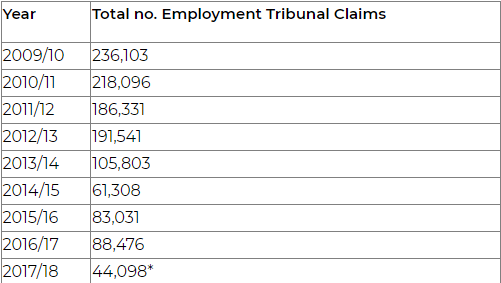Insights
The background
2017 proved to be a busy year for employment law with both the publishing of the Taylor Review on Working Practices, and the unexpected but unanimous decision by the Supreme Court that tribunal fees are illegal.
The coalition government introduced employment tribunal fees in July 2013 as part of an ongoing Employment Law Review, and this included protected discussions and an increase in the qualifying period for unfair dismissal claims to 2 years. The reason for this was the recession and fears expressed in the Business Community about barriers to growth which included the costs of employment litigation.
At the time, the Government’s intention was to ensure that employment laws “maximise flexibility for both parties while protecting fairness and providing the competitive environment required for enterprise to thrive”. By introducing fees, employees wanting to claim would start to contribute a significant proportion to the £84m cost of running the system. This would mean reducing the taxpayer subsidy to tribunals by transferring some of the cost to those who use the service, but also protecting the principle of access to justice for all.
Why the fees didn’t stick
Several years into the system, it was becoming obvious that not everything was going to plan. Since 2013, there had been a significant reduction in tribunal claims (please see Table below) and many employers and business groups were questioning whether the fee levels were set too high.
In February 2017 the government published its “Review of the introduction of fees in the Employment Tribunal” which included a discussion on proposals for changes to the system. However, the review found that “the original objectives [of the fee system] have broadly been met” and furthermore that “while there is clear evidence that ET fees have discouraged people from bringing claims, there is no conclusive evidence that they have been prevented from doing so”.
However, the review did highlight some concerns that the Government decided to address through extending the fees remission scheme, and introducing an immediate exemption from fees on proceedings for recovery from the National Insurance Fund – typically, claims for redundancy payments where an employer is insolvent.
Significant difficulties had been reported with the fee remission system, including challenges of navigating the on-line system and completion of the detailed application form. The CAB was also reporting that some applications were being rejected on grounds that applicants did not have sufficient accompanying evidence, even where they had.
Despite the obvious concerns, the decision was still a big surprise to many when it came. Lord Reed, who gave the judgment in July stated that "the Fees Order effectively prevents access to justice, and is therefore unlawful”. The judges also said fees were set so high, it “has had a deterrent effect upon discrimination claims, among others”, and that it had also put off more genuine cases.
Tribunal statistics
Drawing on statistical data, the Court was presented with evidence showing that since the introduction of the fees, the number of employment tribunals had fallen by 70%. The Court stressed that they considered access to justice to be of value to society as a whole, especially where cases establish legal rules and principles of general importance.

(There was a decrease in ET claims between Q2 and Q3 2013/2014, where total claims accepted fell by 73%. This coincided with the introduction of tribunal fees on 29 July 2013.)
Since July 2017, we have started to see the impact of this judgement with employment tribunal applications increasing by over 60% in the period from July to October 2017. There are no plans to change ACAS involvement and their pre-claim conciliation service, but employers need to ensure that correct employment rights are being given to staff and that individuals are not being subjected to unfair treatment. Promoting positive and good relations with employees will help to avoid the reputational risks, time and cost of tribunal claims.
Employers will still have the same concerns about unfair and nonsense claims being lodged but what the Government decides to do about this remains to be seen. There is still an argument that more proportionate fees could be introduced, but given the strength of the case presented to the Supreme Court and the current focus on Brexit it seems unlikely that the matter will be considered in the short term.
Protect your business
In 2016/17 an average unfair dismissal award was costing businesses in the region of £16k and any form of discrimination award in the region of £25k.These claims can not only cause reputational damage for a business, but for some SMEs it could mean serious strain on their bottom-line.
Having Legal expenses insurance in place becomes something that is invaluable when the unexpected happens. For some lucky businesses, they will never need to call on that insurance to pay out compensation to an unhappy employee, but this doesn’t mean it will never happen.
We have partnered with Abbey Legal insurance to be able to provide our clients with the option of that extra protection should the unexpected happen. Founded in 1992, Abbey Legal insurance have over 25 years of experience in providing SME’s like yourself with Legal Expenses insurance, providing that extra protection should you be involved in a tribunal case or need to cover the legal costs of defending a prosecution by the HSE in the event of an accident.
Please ensure that you take advice on employment matters and for further peace of mind why not request a quotation for Legal expenses insurance by contacting us on 03330 159 853 or email [email protected].
Further updates on this topic will be provided when more information is known. If you have any queries in relation to the above or regarding employee rights in general, please contact our HR Consultancy team for guidance.






